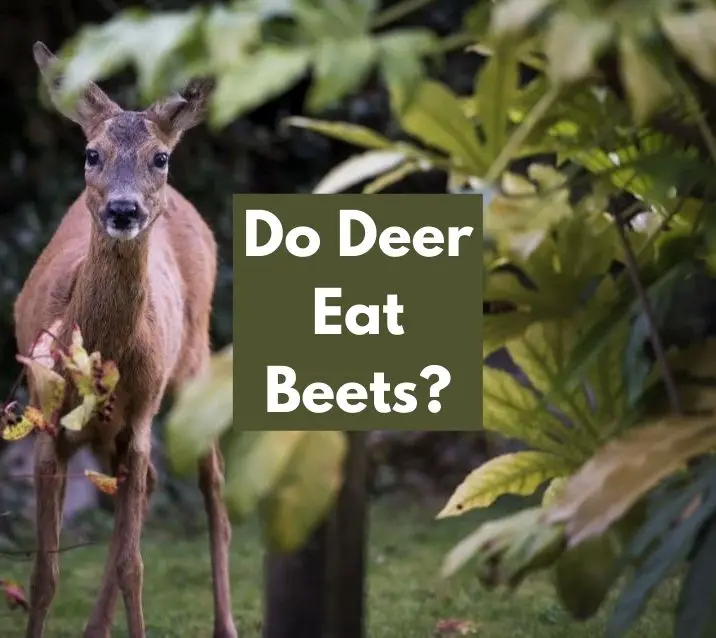There are a lot of myths out there about what deer do and do not eat. One common question is: do deer eat beets?
Yes, deer love beets. Deer will eat the leaves and roots from beets, especially sugar beets. Deer are attracted to beets because of their high sugar content and because they’re easy to digest.
There’s a bit more to learn about deer eating beets which we’ll cover in today’s guide. Read on for more info.
Why Do Deer Eat Beets?
As we covered, deer will eat beets whenever they’ve got the chance.
But why do they do this?
Well, for one, deer are browsing animals, meaning they’ll eat almost anything they come across if they’re hungry enough.
Beets have high sugar content, which deer love, and the leafy greens on top usually stay green well into late winter, which provides deer a rare treat when everything else has died.
Additionally, deer will consume a wide variety of foods like beets based on opportunity.
Check out this video of deer attacking this garden and going crazy over beets:
If you’re not convinced, leave some sugar beets out for deer to eat (or plant some), and wait to see what happens!
What Kind Of Beets Will Deer Eat?
Plenty of farmers and hunters ask if deer eat red beets or another specific type of beet they have on their farm or food plot.
Although a deer’s favorite beet is the sugar beet, they’ll eat any type of beets available to them, including red beets, beet greens and beet tops.
Same goes for different beet varieties: deer will eat avalanche, bull’s blood, chioggia, crosby egyptian, cylindra, detroit dark red, early wonder, forono, golden, golden detroit, lutz green leaf, merlin, moulin rouge, red ace, red ball, ruby queen, touchstone gold, and white detroit beets.
Give it a try and see for yourself by leaving some beets out for deer in your area.
When Do Deer Eat Beets?
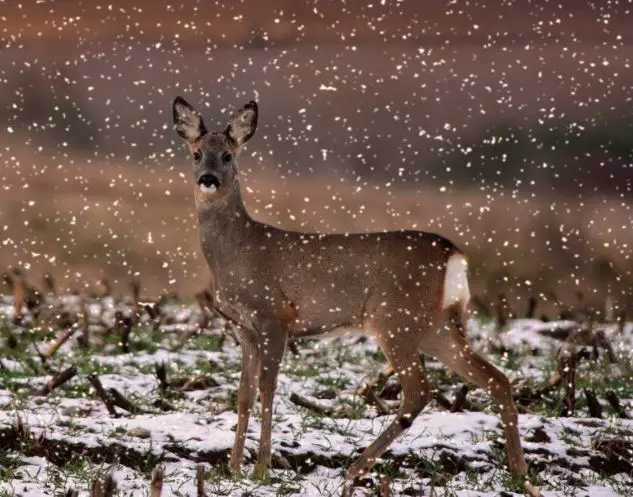
Deer eat the most beets during late fall and winter during the colder months.
If you’re looking to plant beets for a deer food plot, the best time to plant them is early to spring, giving them enough growing time before the colder months hit.
Sugar Beets For Deer Food Plots
Many hunters plant sugar beets in their food plots with a lot of success.
Ideally the deer in your area will already be used to having beets in their diet.
If not, hold off on introducing new foods like beets because they can interrupt their normal food search patterns and make them completely reliant on the beets as their new winter food source.
How Do I Keep Deer From Eating My Beets?
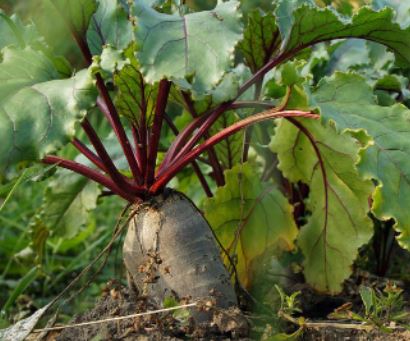
Most folks investigating whether deer eat beets are trying to find ways attract them.
If you’re in the other camp and want to protect your beets from deer, we’ve got some great options for you.
There are a few things to keep in mind when you’re protecting beets from hungry deer: their habits, your scent, repellent options, and when you plant them.
Deer will eat nearly anything if they’re hungry enough, so your main goal is making your garden as least inviting to deer as possible.
Check out our guide on how to keep deer from eating plants where we cover 25 quick and easy tips for keeping hungry deer out of your garden.
Will My Beets Grow Back After Deer Eat Them?
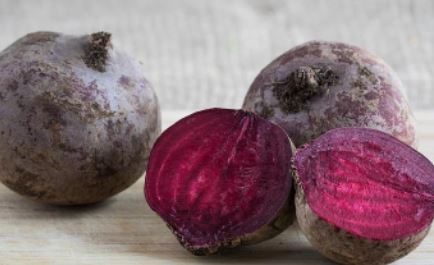
So a hungry deer snuck in your garden and had a feast on your beets. Will they grow back?
Beet roots will continue to grow underneath the ground, so as long as the root wasn’t fully damaged, it will grow back over time.
Continue to care for your beets including water and fertilizing until they’re back to good health.
If your beets don’t bounce back after the next growing season, you’ll need to remove them and start new plants.
Are Beets Good For Deer To Eat?
Feeding deer beets provides them with the following vitamins and minerals:
- Vitamin C
- Iron
- Calcium
- Magnesium
- Potassium
These vitamins and minerals provide deer with many benefits.
For example, vitamin C will help protect deer against scurvy and vitamin assists in deer immune system function.
Deer need calcium for bone, teeth, and antler growth and health as well as other bodily functions like milk production and metabolism.
Potassium is great for deer because it helps maintain good pH balance and aid in proper digestion.
Magnesium is great for antler growth, increasing body weight, and has immune system benefits for deer.
Fat-Soluble Vitamins For Deer
Vitamins A, D, E, K, and calcium are fat-soluble, so they can be stored in the deer’s fat and liver to be used later as needed.
This means that vitamin A content from deer eating beets can be “stored up” for later use, which is highly beneficial.
Water-Soluble Vitamins For Deer
Vitamin C, B Vitamins, niacin, folic acid, and potassium are all water-soluble, which means they cannot be stored, so they must be replaced continually.
So a deer that eats beets for the vitamin C content must continue to consume foods that contain these necessary vitamins to stay healthy.
How To Feed Beets To Deer
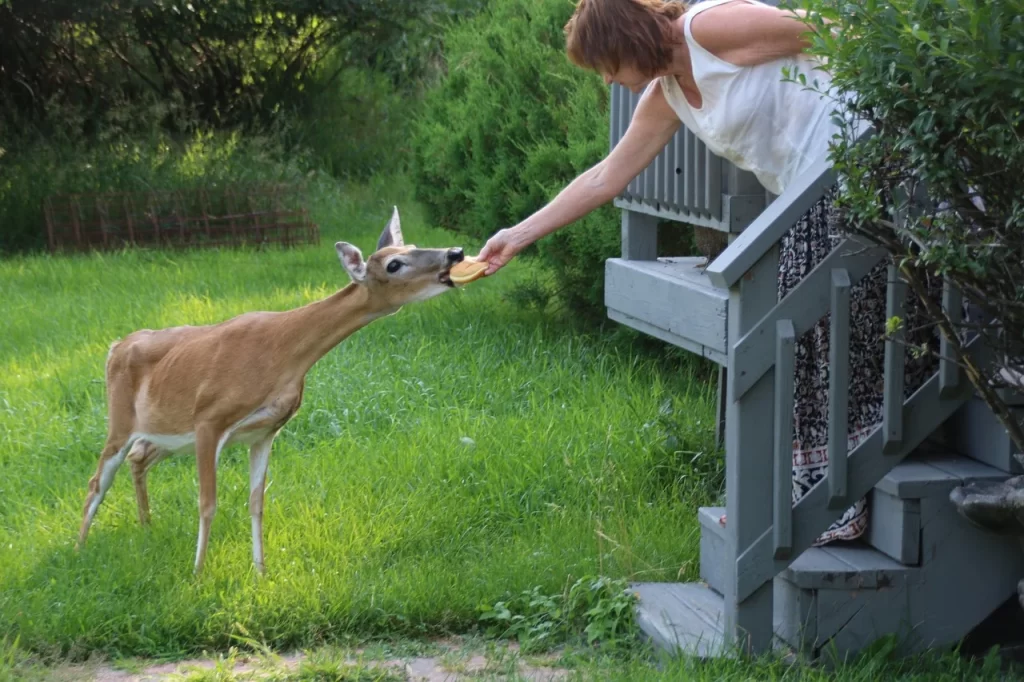
Most gardeners and veggie growers want to keep deer away from their beets.
If you have extra beets or are looking to see if you can feed beets to deer, this next part is for you!
There are a few things to keep in mind when feeding deer beets: the size of the portion, your scent, and how many deer you’re feeding.
Make sure to place the beets on the ground where they’re visible and can be easily reached by deer.
If you’ve got a winter food plot with beets growing in it, the deer will eat them right out of the ground.
If deer are not normally around your area in winter, don’t feed them leading up to winter as they will not migrate where and when they should.
This will lead to the deer relying on you as their food source and can result in starvation.
Should I Cut Up Beets For Deer To Eat?
You don’t need to worry about cutting beets for deer to eat.
Deer’s teeth and jaws are designed to handle much harder foods than beets, so you’re fine feeding it to them as-is.
Don’t Leave Your Scent On Deer Food
Deer have a keen sense of smell that allows them to smell human scent farther than bloodhounds can, and can smell up to six different scents at once.
Deer won’t eat food like beets if they have a strong human scent on them, so you should take care to minimize your trace.
You can do this by rinsing the beets and also washing your hands with antimicrobial soap.
Alternatively, you can put a few drops of apple cider vinegar on your hands when handling food you’ll be giving to the deer.
Another easy option is to use gloves when handling beets for deer to eat.
Consider The Amount Of Deer You’re Feeding
If you have lots of deer in your area, think twice about putting out food continuously for them.
If you bring deer together at the same feeding site, it can increase their risk of contracting chronic wasting disease or other communicable diseases from each other.
Do Deer Eat Beets? Wrapping Things Up
So, do deer eat beets?
The answer is yes!
Deer absolutely love beets, especially sugar beets, and they’ll eat the entire plant if they can.
Sugar beets are a great choice for food plots, as they pull deer in easily.
Fortunately there are many methods you can use and combine to keep deer away from your precious beets.
Try a few and see what works best for you.
Have any observations to add to the discussion? Be sure to let us know in the comments below.
Check our our other helpful wildlife guides while you’re here:
- Do deer eat rutabaga?
- Do deer eat sunflowers?
- Do deer eat alfalfa?
- Do deer eat honeysuckle?
- Do deer eat oats?
- Do deer eat trillium?
- Do deer eat sorghum?
- Do deer eat milo?
- Do deer eat ryegrass?
- Do deer eat corn?
- Do deer eat rice?
- Do deer eat sweet potatoes?
- Do deer eat carrots?
- Do deer eat osage orange?
- Do deer eat green beans?
- Do deer horseradish plants?

